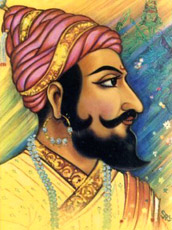 The virtue of courage and bravery, flows in the essence of the native children of the Indian soil . For instance the unyielding Indian soldiers protecting the country , enlivens the inspiring heritage of Shivaji and the Maratha Confederacy .
The virtue of courage and bravery, flows in the essence of the native children of the Indian soil . For instance the unyielding Indian soldiers protecting the country , enlivens the inspiring heritage of Shivaji and the Maratha Confederacy .
The Marathas are the Marathi-speaking social sect, who have descended from 96 different Maratha clans or "Kulis". They evolved from the Indo-Aryan genealogical tree. Their original habitat , has given shape to the present-day state of Maharashtra.
The rise of the Marathas during the second half of the seventeenth century , ushered in a tremendous transition in the history of Indian Politics. As early as the Middle Ages, the Marathas championed the national cause under the "Yadavas" of Devagari. However they lost their glory and position with the emergence of Alauddin Khilji, of the Khiliji dynasty in Delhi.
Nevertheless, their nonchalant attitude, won them the opportunity of planning a comeback. They began exerting immense influence, by some four decades later, in the Bahamani kingdom , and later in the subsequently born, Sultunates.Finally they rose to the zenith of power , under the outstanding leadership of Shivaji. The Maratha power assumed a nationally integrated character.
It is interesting to discover, that the positive Maratha attributes, owe a lot to the natural landscape and geographical features of the Maratha territory .The natural barriers , were provided by the mountain ranges of the Sahyadri fortifying the north and south, and by the Satpura and the Vindhyas,guarding the eastern and western parts, as well as by the water-bodies of Narmada and Tapti rivers. They together rendered the region as remotely accessible for intruders.The rugged landscape, scanty rainfall and little agricultural productivity conditioned the mindscape of the Marathas. They turned out to be a self-confident, brave, ethically pure, honest, greedless and straightforward breed of people.
Again before the rise of Shivaji, the Marathas were united by the motivational teachings of the Bhakti preachers like Tukaram, Ramdas and Ekanath. They imbibed in them a fundamental sense of respect for and devotion to the motherland. They utterly condemned the social-banes like the caste-system and malpractices namely, the slaughter of cows and the dishonour of Brahmins. Also, the Marathas shared a common language, and followed a particular lifestyle. It is their urge to consolidate their treasured faith, which arranged them into a group.
Even before Shivaji , the Marathas were veteran administrators and warriors. Maratha Jagirdars handled a lot of power in the states of Bijapur, Ahmednagar and Golkunda.However, the maratha alliance in India collapsed under Mughal pressure. Under Shivaji`s grandson, power fell to peshwas from leading Maratha families, who ruled effectively in the early 18th century but quarreled as the century waned. The confederacy fell to the British in 1818.






































